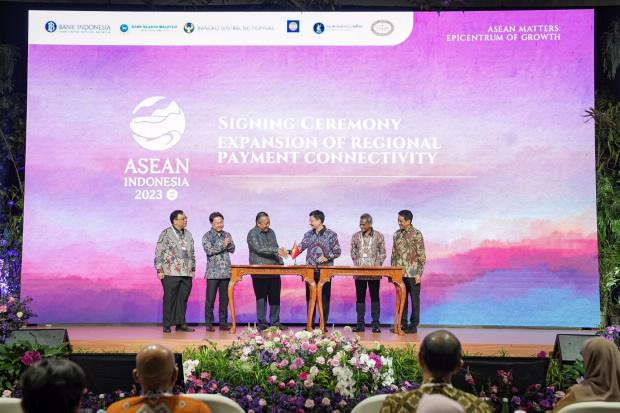share on
The framework will include more eligible cross-border transactions beyond trade and direct investment, which will be implemented gradually.
Bank Indonesia (BI), Bank Negara Malaysia (BNM), and the Bank of Thailand (BOT) have set in place the Framework for Cooperation to Promote Bilateral Transactions in Local Currencies among Indonesia, Malaysia, and Thailand, through the signing of three memoranda of understanding (MoUs) on Friday (25 August 2023).
The signing, which took place on the sidelines of the ASEAN Finance Ministers and Central Bank Governors’ Meeting in Jakarta, Indonesia, was officiated by Bank Indonesia Governor Perry Warjiyo, Bank Negara Malaysia Governor Abdul Rasheed Ghaffour, and Bank of Thailand Governor Sethaput Suthiwartnarueput.
In a joint press release, the three central banks have expressed their commitment to strengthening cooperation in the use of local currencies for bilateral transcations. As shared, the scope of the framework is now expanded to include more eligible cross-border transactions beyond trade and direct investment, which would be implemented gradually. It will also synergise with cross-border payment initiatives for more accessible and efficient local currency settlements.
"The MoUs are set to strengthen cross-border economic activities, enhance regional financial market stability, and deepen local currency markets in the three countries. They supersede the MoUs on local currency settlement framework signed between the three central banks on 27 August 2015 and 23 December 2016," it was added.
State Bank of Vietnam joins ASEAN central banks' Regional Payment Connectivity initiative

In similar news, State Bank of Vietnam (SBV) has officially joined the Regional Payment Connectivity (RPC) initiative. In a joint press release on Friday, the central banks of Vietnam, Philippines, Malaysia, Indonesia, Singapore, and Thailand said this an expansion of the MoU RPC (Memorandum of Understanding on Cooperation Regional Payment Connectivity) that was initiated on the sidelines of the G20 Leaders’ Summit on 14 November 2022.
The RPC initiative was established to strengthen and enhance collaboration on payment connectivity through the development for faster, cheaper, more transparent, and more inclusive cross-border payments. The cooperation encompasses several modalities, including QR-code and fast-payment based cross-border payments.
The goal of the RPC is to make inter-country payments more seamless, convenient, and affordable, allowing individuals and businesses to conduct transactions across the ASEAN region with ease.
With SBV on the list, the RPC group now comprises six ASEAN central banks. This partnership aims to further support post-pandemic economic activities across the ASEAN region, including the promotion of tourism and other service industries. The expansion is also expected to benefit small and medium-sized enterprises.
By connecting their payment systems, ASEAN member states can increase trade, investment, and remittances within the region, it was noted. These are expected to widen financial inclusion and significantly contribute to the overall advancement of the ASEAN economic community.
Going forward, the central banks said, the RPC can also be expanded to neighbouring economies and other nations beyond ASEAN.
Photos: Bank Negara Malaysia's newsroom & State Bank of Vietnam's newsroom
share on
Follow us on Telegram and on Instagram @humanresourcesonline for all the latest HR and manpower news from around the region!
Related topics


